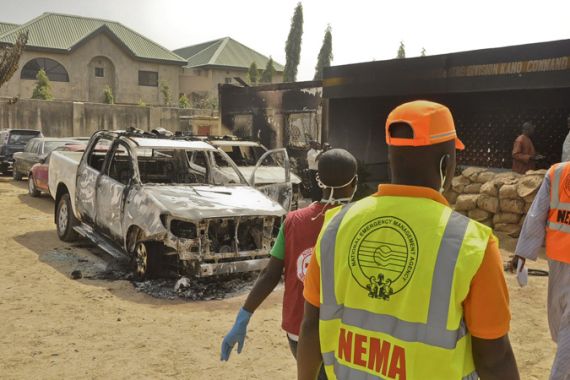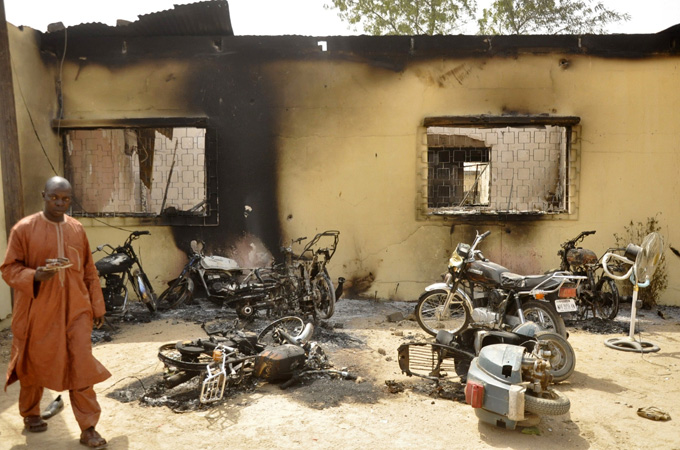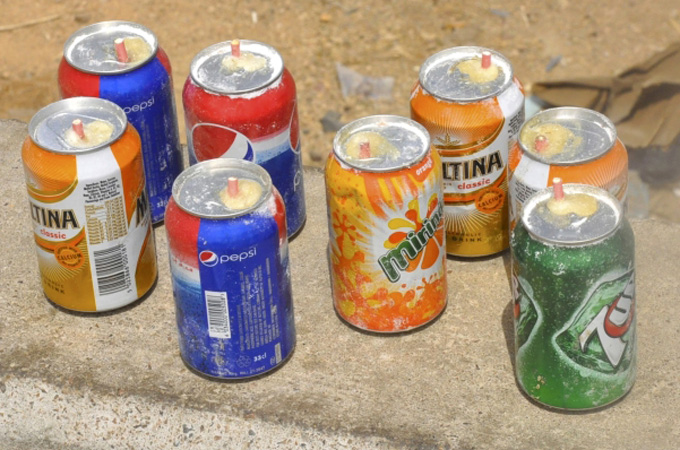Overnight explosions heard in Nigeria’s Kano
Reports of explosions and gunfire near police station in city where attacks last week killed at least 178 people.

 |
| Boko Haram have claimed responsibility for Friday’s deadly attacks which killed scores in Kano [Reuters] |
Explosions and gunfire were reported early on Tuesday from an area near a police station in the northern Nigerian city of Kano, where co-ordinated attacks and gun battles last week killed about 178 people.
The AFP news agency reported early on Tuesday that its correspondent heard a series of blasts and gunshots coming from an area where a mobile police headquarters is located. Details were not immediately clear and police were not available for comment.
A resident reported a similar account.
“I was awoken from sleep by explosions and gunshots coming from the mobile barracks and police station opposite,” the resident said, adding that they had stopped after several minutes.
“It’s terrifying … It’s too dangerous to go out, besides there is curfew.”
Sporadic gunfire could still be heard after the explosions halted.
A nighttime curfew is in effect in the wake of Friday’s bomb attacks and fierce gun battles between Boko Haram fighters and police in Kano, Nigeria’s second largest city.
On Monday, Nigerian police said they had found several cars and vans filled with explosives in the city.
“The police were on a stop-and-search today and in two of the checkpoints, the Boko Haram members on sighting the checkpoints abandoned their vehicles and ran,” a high-level police officer told the Reuters news agency, asking not to be named.
“The vehicles were later checked and the cars were loaded with explosives. Two brand new Hilux open pick-up vans were also found packed with explosives in the Bompai area of Kano.”
Unexploded car bombs
Authorities discovered at least 10 unexploded car bombs, including one near a police station in Kano, as well as around 100 other explosive devices through the day on Monday.
Al Jazeera’s Yvonne Ndege, reporting from Kano, said the cars, which were discovered at a petrol station near the central police station, were “filled with explosive devices that were clearly designed to go off on Friday” but did not.
In reaction to the discovery of the bombs, and potential for the discovery of more explosives, our correspondent said police had been asking for citizens to report any suspicious activities or unattended vehicles parked near symbols of Nigerian authority such as police stations and government buildings.
 |
| Police say they have found locally made explosives in several cars after Friday’s attacks [Reuters] |
Magaji Musa Majiya, a police spokesperson, said officers were able to disarm the car bombs.
According to police figures released on Monday, 29 policemen, three intelligence officers, two immigration officers and scores of civilians were among the dead in last week’s attacks.
“Nearly all Nigerian security agencies are involved [in trying to figure out] how Boko Haram were able to co-ordinate the attacks. They are trying to beef up authority around the symbols of Nigerian authority” our correspondent said.
In Maiduguri, a town in the northeast that has been at the centre of Boko Haram activity, a policeman was shot dead on Monday.
“The policeman was on patrol along with his colleague in a vehicle when the Boko Haram opened fire and shot him dead,” said Simeon Midena, the commissioner of police.
“As usual the killers just disappeared into the crowd.”
Maidiguri patrols
The joint military task force has increased its defences and widened its patrols in Maiduguri in recent days.
On Sunday, the military killed four suspected Boko Haram gunmen in Maiduguri and found explosives in their car, a military spokesman said.
Boko Haram, which was formed in Maiduguri in 2002, has killed hundreds of people in the last year, mostly in and around its home state of Borno, though its attacks have been spreading across the north of Africa’s most populous nation.
The group, loosely modelled on Afghanistan’s Taliban, focuses its attacks mostly on the police, military and government, but has also targeted Christians more recently.
It says it is fighting enemies who have wronged its members through violence, arrests or economic neglect and corruption.
Nigerian President Goodluck Jonathan has been severely criticised for not getting a grip on a group that he says has infiltrated the police, military and all areas of government.